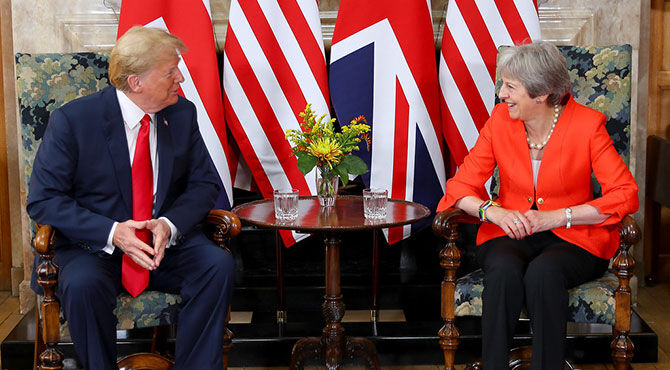Problems ahead for 'substantial' US-UK trade deal
UK business leaders and politicians urge caution in response to President Trump's promise of a substantial post-Brexit UK/US trade deal. Would any such trade deal work for the UK or would it just MAGA?

This work is licensed under a Creative Commons Attribution-NonCommercial-NoDerivs 2.0 Generic License.
 4 June 2019
4 June 2019Donald Trump and Prime Minister Theresa May talk trade deals
On a three-day state visit to the UK, Mr Trump told outgoing Prime Minister Theresa May, "This is something you want to do and my folks want to do. Stick around. Let's do this deal."For her part, Mrs May said there were "huge opportunities" for the two countries to cooperate further on trade. "It is a great partnership but I think a partnership we can take even further - of course, that is with a good bilateral trade deal."UK business leaders skeptical of comprehensive trade deal - or it being sealed "very quickly"
Yet business leaders remain sceptical over the chances of any truly comprehensive deal being achievable, let alone of it being sealed "very, very quickly", as the president has claimed is possible.Experience has shown that comprehensive deals take up to a decade to achieve. Ben Digby, international director at the Confederation of British Industry, commented, "Free trade agreements always take a number of years. I think we've had some experience of that in the last couple of years in the Brexit negotiations."But there are a few things that we could be getting on with immediately to facilitate trade between both countries. I'd look at people - the visa system. Let's look at making it a bit easier for people to travel and do business in each country."What drives Trump's trade policy?
Mr Trump's record on trade is not particularly encouraging: on taking office, he sought to scrap the North American Free Trade Agreement with Canada and Mexico; for the past year, he has been involved in a tit-for-tat trade war with China; and he is now threatening to impose 25 per cent tariffs on goods from Mexico unless the Mexicans arrest the flow of migrants entering the US.Adam Posen, director of the Peterson Institute for International Economics in Washington, said that the president's threats against Mexico should make countries think twice about signing a trade deal with America.“By weaponising tariffs, Trump makes evident that he is driven in trade policy by his ideological and perhaps political agenda rather than any tactics to improve US bargaining leverage,” Mr Posen told the Financial Times.US/UK trade deal: chlorinated chicken and a dismantled NHS would be on the menu for the UK
There would also be many practical problems for a US-UK deal. Woody Johnson, the US ambassador in London, told the BBC this week that all parts of the economy would be "on the table" as part of trade negotiations.That would include the British agricultural sector, to which the Trump administration has said that it wants to secure "comprehensive access", which could mean opening the doors to GM crops, chickens washed in chlorine, hormone-fed beef and animal feed with antibiotics, which are banned in the EU but common in the US.Mr Johnson also suggested American private health providers should have access to the NHS as part of a trade deal, sparking an immediate political backlash and prompted UK International Trade Secretary Liam Fox to state bluntly that "regulation of public services is a clear exemption when it comes to trade agreements".Of course, the UK cannot officially open trade talks with any other nation until it has left the EU, which is Britain's largest economic partner, accounting for more than 45 per cent of its trade. The US ranks second, with 18.6 per cent of total UK trade in goods and services.“We do three times as much trade with the EU than the US because it is closer and there is regulatory alignment,” said Alan Winters, director of the UK Trade Policy Observatory at Sussex University. “Even if we had regulatory alignment with the US, the distance factor would still mean we would do less trade.”No-deal Brexit: fears that the UK will enter into a trade deal that will favour America
On the other side of the coin, however, is the fear that, were there to be a no-deal Brexit, the UK could be so anxious to secure new trade arrangements it might hurry into an agreement with the US, no matter how much the terms might be favour Mr Trump's pledge to "make America great again".Read the latest Relocate news about the US and Brexit
Subscribe to Relocate Extra, our monthly newsletter, to get all the latest international assignments and global mobility news.Relocate’s new Global Mobility Toolkit provides free information, practical advice and support for HR, global mobility managers and global teams operating overseas. Access hundreds of global services and suppliers in our Online Directory
Access hundreds of global services and suppliers in our Online Directory
©2025 Re:locate magazine, published by Profile Locations, Spray Hill, Hastings Road, Lamberhurst, Kent TN3 8JB. All rights reserved. This publication (or any part thereof) may not be reproduced in any form without the prior written permission of Profile Locations. Profile Locations accepts no liability for the accuracy of the contents or any opinions expressed herein.









































